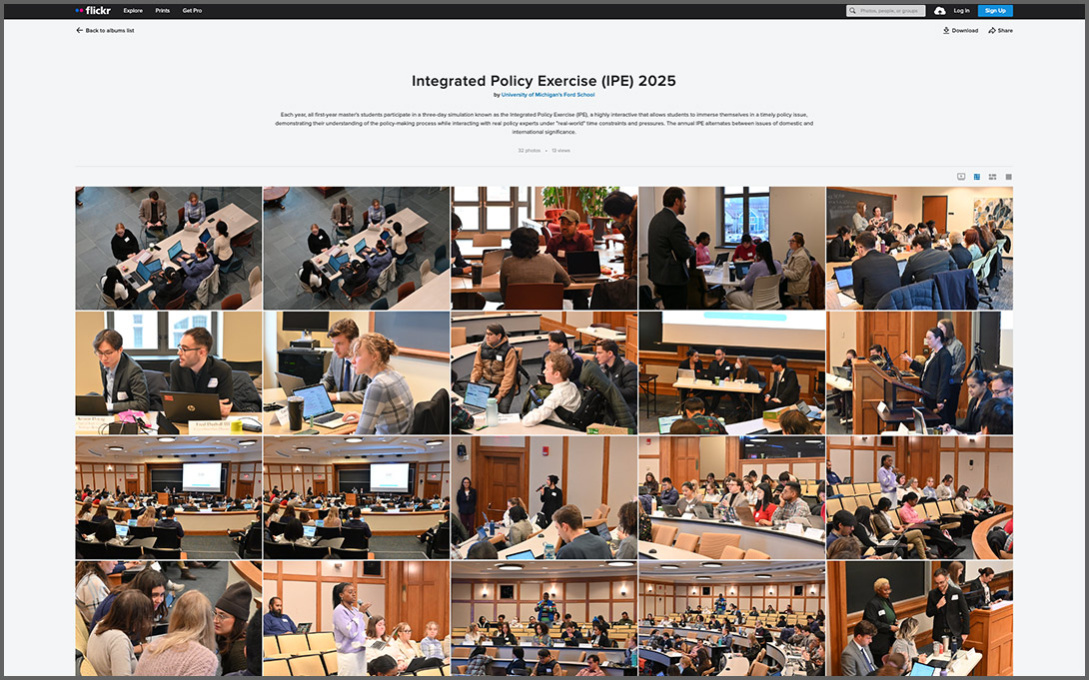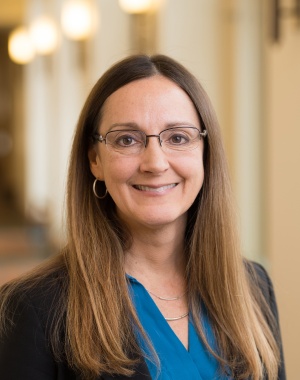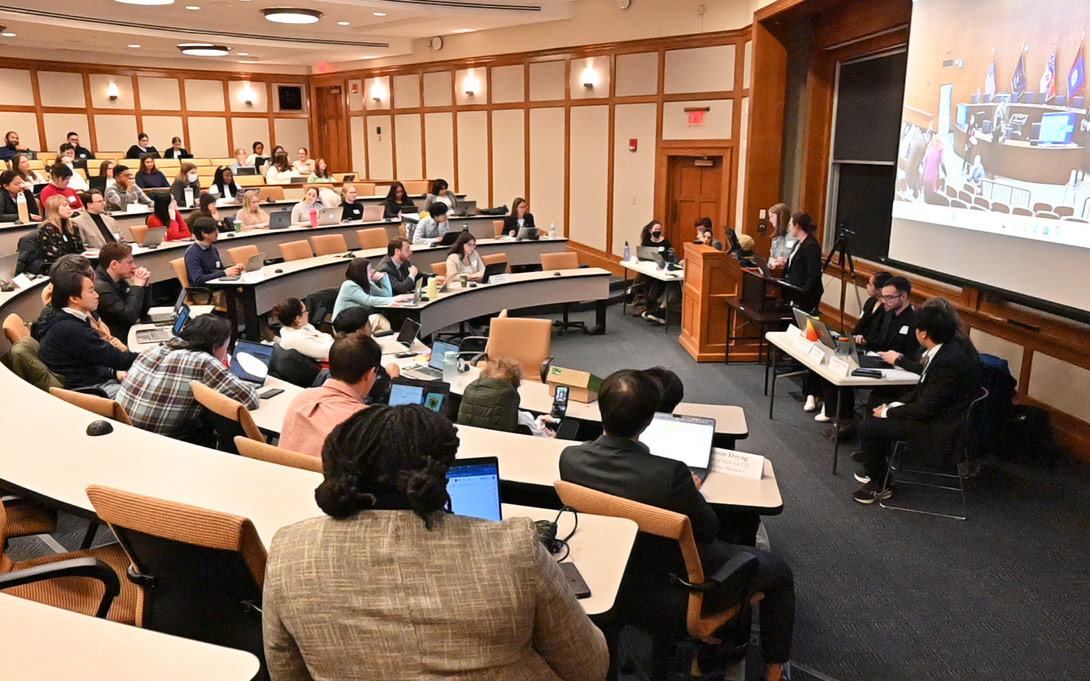
Detroit, like many U.S. cities, faces a severe affordable housing shortage. According to a recent report by the Detroit Justice Center, the city needs roughly 46,000 more affordable housing units to meet current demand. Against this backdrop, the 2025 Integrated Policy Exercise (IPE) at the Ford School of Public Policy, offered graduate students the opportunity to grapple with the difficult and complex challenges of local housing policy.
The IPE is an annual, multi-day policy simulation that immerses students in real-world policy issues, allowing them to develop essential skills in collaboration, policy writing, analysis, speaking, and negotiation. This hands-on experience challenges students to engage deeply with timely policy matters through role-playing and simulation exercises.
Conducted over three interactive days at Weill Hall, approximately 100 students took on roles as key city decision-makers, financial institutions, advocacy groups, community organizations, nonprofits, developers, and residents. Together, they collaborated to devise and adopt solutions to address Detroit’s housing crisis.
Elisabeth Gerber the Jack L. Walker, Jr. Professor of Public Policy, led this year’s IPE simulation, marking her 12th year in this role. "This exercise is a fun and engaging way to better understand how public policy is made in the real world," she said. "Engaging with these challenges enables students to practice policy analysis, learn about municipal policy processes, and gain insights into stakeholder engagement, political relationships, and negotiation practices.”
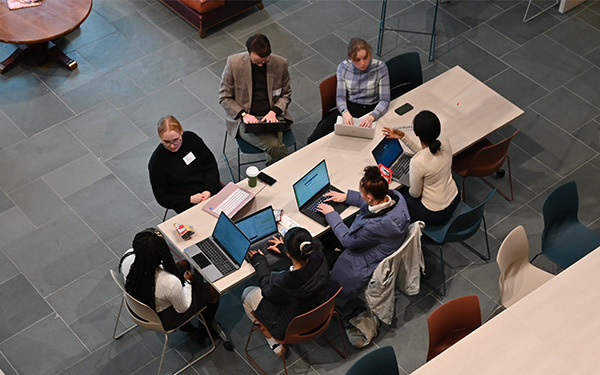
As a role-playing activity, the IPE also cultivates empathy for diverse policy perspectives. "Some students might have to take positions they don’t personally agree with," Gerber observed. "They work to understand those perspectives and the underlying values behind supporting or opposing a proposed policy. The simulations provide a safe space to explore diverse viewpoints and build skills crucial for collaborative policymaking."
Throughout the exercise, students analyzed, negotiated, and amended proposed city ordinances during closed-door strategy sessions, mock city council meetings, and public hearings. These efforts culminated in a press conference with the “Mayor” and a final “City Council” vote. On the last day of the IPE, participants assumed the roles of Detroit residents to critically assess how the newly crafted ordinances would impact various neighborhoods.
“I was impressed with how deeply students examined the policy options," Gerber continued. "Before this exercise, most of the students had not thought much about local housing policy, but through collaboration, they generated creative and thoughtful ideas and then confidently presented them to their peers."
Preparation for the simulation involved analyzing a wide array of data and resources assembled by Gerber and Graduate Student Instructors Ava Pecora (MPP ‘25) and Kavita Rani (MPP ‘25). Students also heard from Julie Schnieder (MPP/MUP '12), Director of the Housing & Revitalization Department at the City of Detroit, as well as a panel of fifteen Detroit residents who shared their perspectives about affordable housing and its effects in their neighborhoods.
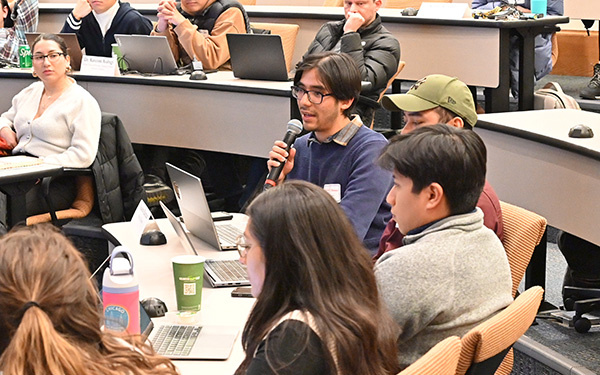
The exercise underscored the intricacies of political maneuvering and often limited access to crucial data. For some students, it illuminated the complexity of political decision-making. For others, it highlighted the perpetual challenge of insufficient time and data when making policy decisions.
Students also reflected on the role of social media and media in public knowledge and influence. Utilizing the ViewPoint software platform, they communicated and accessed simulation resources, echoing the dynamics of social media. Mimicking social media, students could post messages in the voice of the role they were playing. One student noted a disparity in perceived issues: while public hearings concentrated on substantive housing topics, social media commentary veered towards unrelated concerns. “If someone only saw the social media messages, they wouldn’t grasp what was actually being discussed in the room,” the student remarked.
Reflecting on the IPE experience, Gerber observed that “when students are encouraged to step outside their comfort zones, grapple with complex real-world challenges, and actively engage with one another to come up with creative solutions, extraordinary learning takes place.”
